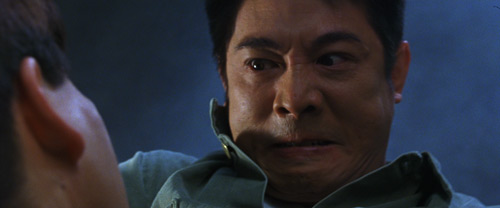
ROMEO MUST DIE
ZERO STARS/**** Image B Sound B Extras C
starring Jet Li, Aaliyah, Isaiah Washington, Delroy Lindo
screenplay by Eric Bernt and John Jarrell
directed by Andrzej Bartkowiak
CRADLE 2 THE GRAVE
ZERO STARS/**** Image B+ Sound B+ Extras D
starring Jet Li, DMX, Anthony Anderson, Gabrielle Union
screenplay by John O’Brien and Channing Gibson
directed by Andrzej Bartkowiak
by Walter Chaw There are a lot of interesting things about Jet Li’s sad run through Hollywood, among them the fairly simple question of why, in Romeo Must Die, this particular yellow Romeo must die. But then he doesn’t die, and he also doesn’t get to kiss the girl, who isn’t white but Aaliyah (black)–mitigating, I would have thought, the taboo against Asian men in American cinema having any kind of sexuality that isn’t ridiculous (see: Long Duk Dong) or that involves a white lady. In his next film, Kiss of the Dragon, Jet teams up with a white prostitute (Bridget Fonda) and, belying the sly Orientalist promise of the title, doesn’t get to kiss her, either–and she’s a fucking hooker. It’s a cultural ban so stringent that there’s a specific category of porn, deeply perverse, that is not only interracial, but specifically Asian man on white woman. Not long after 2003’s Cradle 2 the Grave, Li played an Asian man kept on a leash who, at a word, is made to perform martial arts for his white master’s favour. Danny the Dog (retitled Unleashed in the United States…why, again? Because of Hollywood’s sensitivity?) is probably the most poignant expression of the plight of the Asian action hero in the United States: castrated, humiliated, valued for the single trait of knowing kung fu–even if, as it was for Jackie Chan in the Karate Kid reboot, Chinese “kung fu” is reconfigured as Japanese “karate.” Chris Tucker’s favourite joke in the Rush Hour movies, after all, is to mistake the two cultures–a favour to neither and funny, probably, only to Tucker.
 **½/****
**½/****
 ***½/****
***½/**** *½/****
*½/**** **/****
**/**** ****/****
****/**** *½/****
*½/**** ***/****
***/**** ***½/****
***½/**** En Kongelig Affære
En Kongelig Affære ***½/****
***½/**** Jagten
Jagten a.k.a. War Witch
a.k.a. War Witch
 ***½/****
***½/**** De rouille et d’os
De rouille et d’os